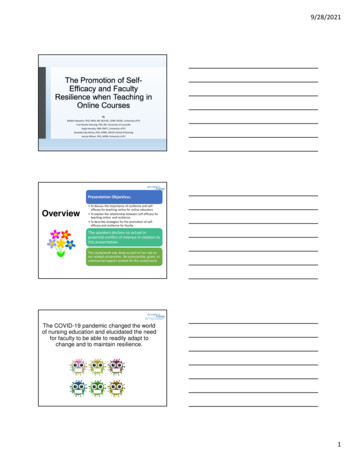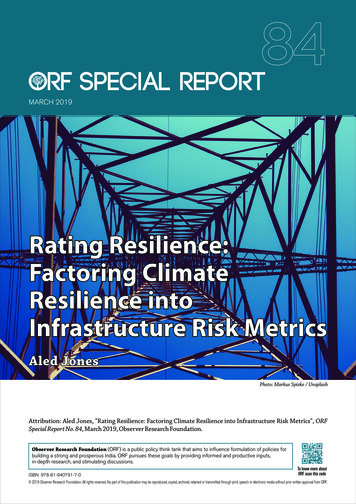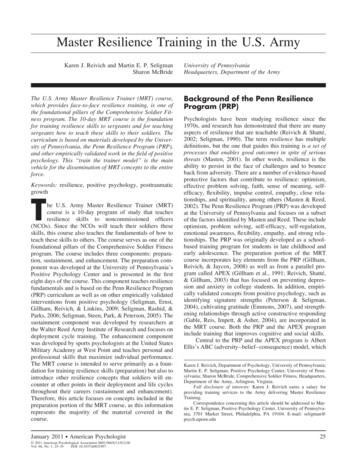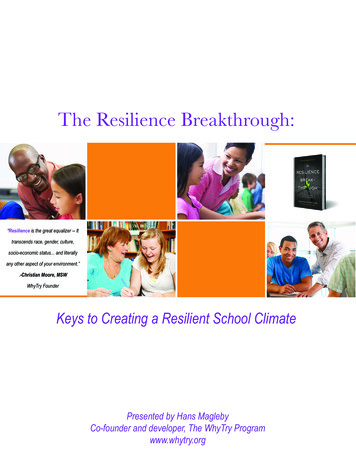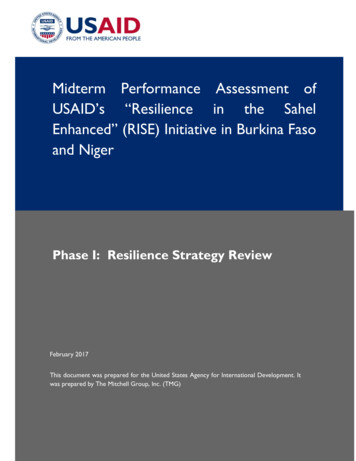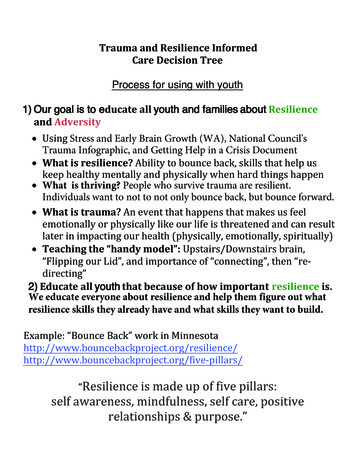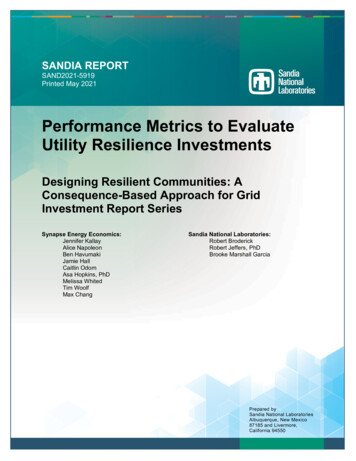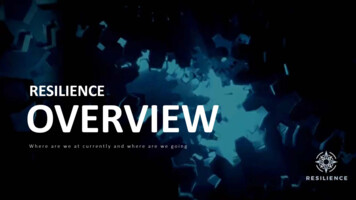
Transcription
FOSTERING ECONOMIC RESILIENCEIN A WORLD OF OPEN ANDINTEGRATED MARKETSRISKS, VULNERABILITIES AND AREASFOR POLICY ACTIONREPORT PREPARED FOR THE 2021UK PRESIDENCY OF THE G7
2 AcknowledgementsThis report is the result of a collective effort delivered under the leadership of Nicolas Pinaud, OECDSherpa to the G7 and G20, and Laurence Boone, OECD Chief Economist, with coordination by the OECDSherpa Office and Global Governance Unit (Nejla Saula, Raffaella Centurelli and Alice Holt) and theEconomics Department of the OECD (Alain de Serres).Chapter One was drafted by the Economics Department, Chapters Two and Three were drafted by theTrade Directorate, Chapter Four was drafted by the Directorate for Science, Technology and Innovation,all of which with extensive contributions from the Directorate for Financial and Enterprise Affairs and thePublic Governance Directorate.Authors and contributors were: from the Economics Department: Alain de Serres and Peter Jarrett (lead drafters of Chapter 1); from the Trade Directorate: Julia Nielson (lead drafter of Chapter 2 and 3) with contributions fromAnnelies Deuss, John Drummond, Lee Ann Jackson, Javier Lopez Gonzalez, Sébastien MiroudotJehan Sauvage, Silvia Sorescu, Susan Stone and Frank van Tongeren; from the Science, Technology and Innovation Directorate: Dirk Pilat (lead drafter of Chapter 4)with contributions from Laurent Bernat and Ghislain de Salins; from the Sherpa office: Alice Holt (drafter of the Introduction and Key Findings) under the guidanceof Nejla Saula; from the Directorate for Financial and Enterprise Affairs: Antonio Gomes, Hans Christiansen,Thomas Dannequin, James Mancini, Coralie Martin, Ruben Maximiano, Robert Patalano, JoachimPohl, Alejandra Tadeu and Martin Wermelinger; from the Public Governance Directorate: Elsa Pilichowski, Janos Bertok, Charles Baubion, EdwinLau, Nikolai Malyshev, Barbara Ubaldi, Marco Daglio, Marianna Karttunen, Miguel Amaral, JackRadisch, Piotr Stryszowski.The contributions from the Environment Directorate (Anthony Cox and Andrew Prag) and the NewApproaches to Economic Challenges Unit (William Hynes) are also gratefully appreciated.The support of Veronica Humi (Economics Department) and Deniz Isbilen (Sherpa Office and GlobalGovernance Unit) in finalising and formatting the report is gratefully acknowledged.
3PREFACECrises such as the Global Financial Crisis (GFC) in 2007-09 and the COVID-19 pandemicin 2020 demonstrate what can happen when risks become reality and resilience is put tothe test in our globalised economies and societies. Global openness and integration havebrought important benefits to raise productivity gains, facilitate technology diffusion andlift hundred millions of people out of poverty. However, within such globally integratedeconomies, shocks, whether endogenous, such as the GFC, or exogenous, such as thepandemic, can rapidly turn into severe global economic downturns, as impacts cascadethrough interconnected systems and sectors.Our economies and societies face a multifarious array of risks. Some acute shocks maybe challenging to predict, while others may be the result of the chronic build-up ofvulnerabilities, such as the impacts of climate change or imbalances and distortions inmarkets, both of which are shaped by policy and regulatory choices. Building resilienceacross our economies as a whole calls for a systemic policy approach to prevent thebuild-up of vulnerabilities and reduce exposure to shocks; to absorb shocks when theydo occur; and, to recover rapidly and sustainably from these shocks through adaptationand transformation (“bouncing forward”).This report, prepared by the OECD for the UK Presidency of the G7 to inform the debatesof the G7 Panel on Economic Resilience, provides a conceptual framework forunderstanding challenges to economic resilience articulated around endogenous andexogenous risks, as well as acute shocks and chronic vulnerabilities. The report focuseson three policy areas where international co-operation is critical and where coordinationthrough the G7 and other global fora would bring substantial benefits for all countries.These include strengthening the resilience of global supply chains, particularly foressential goods; improving the international rulebook to make global markets morepredictable and reliable (such as for critical minerals), notably by addressing distortionsand imbalances which are sources of vulnerability, and by levelling the global economicplaying field; and, addressing the challenges stemming from the digital transformation ofour economies and from emerging technologies. The latter can be both sources ofvulnerability and a bulwark for future resilience through improved innovation policies,financing models and regulatory approaches.Addressing these challenges, alongside heightened ambitious efforts to tackle climatechange and social inequalities, is essential to improve economic resilience but also torebuild trust in governance structures, institutions and evidence itself. This is becauseeffective crisis responses and recoveries depend on public acceptance and adherenceto necessary measures and policies
4 This report, which includes analysis and key recommendations, provides policymakersand stakeholders in the G7 and beyond a framework to understand the main sources ofrisks and vulnerabilities and a set of policy options to strengthen economic resilience asthey set in place the foundations for a robust and sustainable recovery.Laurence BooneOECD Chief EconomistNicolas PinaudOECD Sherpa to the G7 and G20
5Table of contentsPREFACE3INTRODUCTION8Key Findings and Policy RecommendationsSTRENGTHENING RESILIENCE TO SHOCKS, RISKS ANDVULNERABILITIES IN AN INTERCONNECTED WORLDIntroduction and scene setting1.1.1. Learning the lessons of the most recent large shocksA conceptual framework for economic resilience1.2.1. How policies can lower the risk of shocks, prepare for them and speed recovery1.2.2. A broad range of vulnerabilities and shocks can be analysed through the frameworkMajor sources of risks, potential implications and areas of policy response1.3.1. Weaknesses revealed by COVID-191.3.2. Policy options to manage health-related risks1.3.3. Spill-overs from COVID-19 to other risksThe evolving nature of globalisation and the need for updating the international rulebook1.4.1. The economic benefits proffered by globalisation1.4.2. The vulnerabilities: concentration, trade and investment restrictions, trade creditThe benefits and risks arising from technological advances1.5.1. The economic benefits from technological advances, in particular digitalisation1.5.2. There are also related risks1.5.3. Other aspects of science, technology and innovation that contribute to resilienceThe crucial role of environmental risks, especially climate changeSumming upReferencesBUILDING RESILIENT GLOBAL SUPPLY CHAINSAcute shocks can place huge strains on global supply chains Yet, overall, supply chains have held up reasonably wellDiversified and open markets are needed to ensure supply, in particular for essential goodsHow governments can work with the private sector to foster resilient supply chains2.4.1. The private sector has a critical role in managing supply chain risks2.4.2. Promoting resilience through responsible business conduct will also be key2.4.3. Consultation, co-operation and coordination between the private and public sectors isneededGovernments have a toolkit of policy options to promote resilience of global supply 5152535757596061
6 2.5.1. At the national level, there are a range of “no regrets” policies governments canimplement to underpin the resilience of global supply chains2.5.2. Governments may also consider specific measures to ensure supply of essential goods2.5.3. International co-operation is also essential for resilient global supply chainsSome governments are reconsidering the role of global supplyConclusion6165667072ReferencesINTERNATIONAL RULE-MAKING FOR RESILIENT, OPEN ANDINNOVATIVE GLOBAL MARKETS73A resilient global economy needs strong institutions, rules and norms to ensure open, fairand innovative marketsRebuilding trust in the global rules-based system3.2.1. Rebuilding trust in the international rulebook will require action across the whole system3.2.2. Using the full range of tools for international economic co-operationRegulations and standards to reduce market fragmentation3.3.1. An open, fair and resilient global economy rests on international co-operation onstandards and regulationsEnsuring a level playing field: government support and state owned enterprises3.4.1. International action is needed to tackle market-distorting government support3.4.2. Structural government support needs to be distinguished from emergency support3.4.3. Concerns are also arising in international investment3.4.4. A level playing field for SOEs is critical to maintain trust and openness in the globalmarketplace3.4.5. The State as an unintended “owner”: keeping emergency government supportcompatible with competitively neutral long-term outcomes3.4.6. And governments need to address practices that undercut confidence and faircompetition such as foreign bribery and illicit tradeEnsuring reliable and predictable global markets3.5.1. International co-operation is needed to ensure the supply of critical mineralsSustainable investment for a resilient global 688899191939597Annex A: OECD Matrix of Government Support Measures OECD100HARNESSING EMERGING TECHNOLOGIES FOR RESILIENT ANDDYNAMIC ECONOMIES101Digital transformation: implications for economic resilienceAdvanced science, technology and innovation systems in support of resilienceGovernance of emerging technologies and economic resilienceReferences101109112117TablesTable 1.1. Overview of sources of risks and areas for policy actions43
7FiguresFigure 1.1. The nature of shocksFigure 1.2. The conceptual framework of economic resilienceFigure 2.1.Use of policy tools for critical infrastructure resilience acrossFigure 3.1. Global FDI flows, Q1 2016 – Q2 2020 (USD billionFigure 4.1. Teleworking before and during the COVID-19 crisis in Italy, by industryFigure 4.2. Shift in the policy mix for R&D support, 2000-1821236493102110BoxesBox 1.1. Reduced citizen trust in public institutions as a major risk for economic resilienceBox 1.2. The recent evolution of perceived risks and government preparedness for themBox 1.3. The risks of concentrated production of key digital components and other critical raw materials: thecases of semiconductors and rare earths and other strategic metallic mineralsBox 1.4. Digital security risksBox 1.5. How business dynamism contributes to a speedy and sustained recoveryBox 2.1. Interconnected versus localised economies: insights from the METRO modelBox 2.2. Global supply chain resilience to natural hazardsBox 2.3. OECD due diligence guidance for responsible business conductBox 2.4. Ensuring the resilience of critical infrastructureBox 2.5. International co-operation and essential goods - lessons from the food price crisisBox 3.1. OECD Survey on rulemaking by international organisationsBox 3.2. Measuring market-distorting support in industrial sectorsBox 3.3. Ensuring competitive neutralityBox 3.4. Key principles for state intervention in times of crisisBox 3.5. Sustainable investment in infrastructureBox 4.1. The importance of competitive digital markets for economic resilience and recovery181931363755586064687882878994108
8 INTRODUCTION1.Economic resilience has emerged as a priority in response to the devastating impacts of recentsystem-wide crises, in particular the Global Financial Crisis (GFC) of 2007-2009 and the 2020 COVID-19crisis, both of which will continue to leave lasting scars on our economies and societies. The fallout fromthe GFC hit the poorest hardest, contributing to an extensive erosion of public trust in global economicgovernance. The COVID-19 crisis has brought unprecedented impacts in peacetime, with many countriesputting entire sectors of their economy “on hold” to contain the spread of the virus, necessitating in turn amore prominent role for the state. Tests to economic resilience have come -- and will continue to come -- inmany forms. Some may be challenging to predict; others, such as the impacts of climate change, arewell- documented and already bringing severe impacts. The lessons from COVID-19 and other crises showthat we need to have resilient economies and societies as a whole, not just resilient financial sectors.2.As countries overcome this crisis through a combination of vaccine rollouts, ongoing containmentand fiscal support measures, policymakers are increasingly looking to strengthen resilience to future crisesas an integral part of “building back better” after the pandemic. No two crises will ever look the same, butit is critical to learn the lessons of this one and those that preceded to guide the policy actions needed tostrengthen economic resilience understood as the following policy “tryptic”: preventing the build-up of potential vulnerabilities; preparing to absorb shocks when they occur; and the ability to engineer a swift rebound from those shocks.3.These include increasing ambitions to tackle existing and emerging vulnerabilities, notably, insupply chains; climate change, including the catastrophic potential of tipping points; 1 and a range ofsecurity threats, including those arising from the digital transformation, which is both an emerging sourceof risk while also offering new solutions to increase adaptability and innovation for resilience. It is alsonoteworthy that countries are increasingly using economic levers for national security purposes. Ascountries work to address these challenges, trust in governance structures, institutions and evidence itselfis critical to ensuring public acceptance and adherence to necessary measures, and yet trust has beenone of the casualties of recent crises. It is important therefore to address not only exogenous risks andacute shocks to the system, but also risks emerging from within the economy itself, often from the buildup of gradual distortions or imbalances, which can be addressed through sound regulatory frameworksand principles for open and transparent markets.4.Interconnectivity and global openness remain two of the structuring and determining features ofthe modern world, which have brought considerable benefits to much of the global population. Growingglobal economic integration has facilitated productivity gains and their diffusion, global economic growth,1“Tipping-points” are thresholds that if exceeded could lead to abrupt and irreversible changes in the climate systemthat could have catastrophic and cascading outcomes for natural systems and society. Recent IPCC research suggestsa risk of triggering some tipping points even with warming of less than 2 C, such as the melting of the West AntarcticIce Sheet (WAIS) and the Greenland Ice Sheet (GIS). Other examples of potential non-linear irreversible changesinclude the potential decrease of Atlantic overturning circulation; increases in ocean acidity and accelerated methaneemissions from permafrost melting
9the integration of emerging economies in global markets and the lifting out of poverty of hundreds ofmillions of people, while also disseminating technological advances and spurring transformativeinnovation, not least in the field of digitalisation. However, for all its benefits, global integration has also leftmany people behind and has created systemic weaknesses, particularly as the nested systems andcomplex imbrications of globalised economies (across areas as diverse as digital, communication,transport, production, finance and eco-systems) increase the risk of failures cascading from one system toanother, as seen during the GFC and the COVID-19 crisis. The concentration of industrial capacitiesand economic activity into smaller though more efficient sectors, up to the international level, hasproduced profitable and efficient yet potentially fragile supply chains, and economic exchanges whosedisruptions can bring unintended consequences. When these concern essential or critical goods, there isa need to be particularly cautious to ensure global supply, even in the event of shocks. Developingresilience through international co-operation and within an open international economic system is vital tobuild systems that are designed to facilitate recovery and adaptation in the aftermath of disruption – whilekeeping markets open and upholding the benefits from an open, interconnected global economy.5.The G7 has the potential to play an important role in helping to develop a common understandingof how global interconnectedness and openness have both contributed to and challenged economicresilience; in providing a forum to discuss collective risks and in fostering international co-operation oneconomic resilience. In this respect, particularly in the context of COVID-19, the decision by the 2021UK Presidency of the G7 to convene a Panel on Economic Resilience is timely and necessary. This report,prepared by the Organisation for Economic Co-operation and Development (OECD), aims to support andframe the discussions of the Panel to develop a shared understanding of the collective, systemicchallenges to our economic resilience. The analysis is intended to inform the Panel’s discussions onsystems-based approaches to strengthening the resilience of open global markets and supply chains, andto help build consensus around safeguarding the delivery of global public goods and shaping incentivesfor long-term resilient, inclusive and sustainable economic growth.6.The OECD has more than a decade of experience in developing a systems-based approach toresilience, covering prevention and absorption, but also recovery and adaptation in the aftermath ofdisruption. Risk management of a system driven by resilience as a central goal should actively identifythose uncertainties and risks likely to have an effect on resilience and seek to prevent and mitigate theiracute manifestations and effects, while also acknowledging that the infinite variety of future threats cannotbe adequately predicted and measured, nor can their effects be fully understood ex ante. Equally,governments can and should learn the lessons of past crises, such as the GFC as well as the ongoingCOVID-19 crisis, to ensure our international economic systems can withstand a broad range of shocksand facilitate recovery, drawing on the strengths of interconnected, open and transparent global marketeconomies.7.This report addresses key areas to support international co-operation on resilience through the G7and beyond. Chapter One makes the empirical case for considering the strengthening of resilience as a primaryobjective of public policy, as well as proposing a conceptual framework for a systemicunderstanding of economic resilience. Chapter Two sets out how global, diversified, open markets depend upon well-functioning globalsupply chains, which can nevertheless face challenges from a global demand and supply crisissuch as COVID-19. The analysis demonstrates that international co-operation has a key role toplay in ensuring resilient global supply chains, notably through increasing transparency onessential goods, enhancing international regulatory co-operation, disciplining export restrictionsand collaborating on global standards, including on Responsible Business Conduct (RBC).However, for global markets and global supply chains to serve as a source of resilience,governments, as well as the public, need to have confidence that global markets are open and fair.
10 Chapter Three discusses how to promote a level playing field for competition, trade andinvestment, including addressing concerns about government support, as well as ensuring globalmarkets are reliable and predictable. This includes through access to critical raw materials,disciplining export restrictions and avoiding harmful practices that undermine trust, such as foreignbribery. International co-operation on standards and regulation are essential to ensure that all canbenefit from global openness, to prevent market fragmentation and to align global flows of tradeand investment with international commitments such as the 2030 Agenda for SustainableDevelopment and the Paris Agreement. Chapter Four explores the role of emerging technology as both a source of potential shocks anda tool for adaptation and recovery, as seen during the COVID-19 crisis. It provides an overview ofthe key technologies that are expected to emerge in the next 5-10 years, as well as theopportunities and challenges they may raise, including the need for more forward-facing and agileregulatory approaches.
11Key Findings and Policy Recommendations8.In our globally interconnected economies, shocks within a part of the economic system -- ororiginating from outside -- can turn into severe global economic downturns through cascading failuresacross the whole system, contributing to growing inequalities, polarisation of society as well as trust erosionand the spreading of disinformation. Building resilient economies and societies requires a systemicapproach to a diverse range of known and unknown risks, from pandemics and climate change todevelopments in globalisation and emerging technologies. Building protective social capital and trust mayhelp to reduce the cost of future crises, such as pandemics and other crises, for which social behaviourand trust in institutions and science matter. This calls for reinforcing the capacity of the economic systemto withstand or absorb a variety of shocks and to adapt or transform itself to bounce forward during therecovery. It also implies a need to mitigate risks, through efforts to detect and address distortions andexternalities at their source, so that the chronic build-up of vulnerabilities and tensions within the systemturn into acute events.Strengthening resilience to shocks, risks and vulnerabilities in an interconnected world Governments could revise their risk management policies and frameworks to ensure asystemic and comprehensive all-hazards-and-threats approach to resilience with internationalco-operation and tools playing a central role, consistent with the OECD Recommendation on theGovernance of Critical Risks. This should be supported by a comprehensive evaluation of lessonslearned from the COVID-19 crisis, including through benchmarking of preparedness andresponses. For example, comparing national health emergency response plans. Governments, starting with the G7, could work on identifying and agreeing on a diverse setof vulnerability indicators covering a range of threats. This would allow for the monitoring ofdomestic threats, as well as potential interlinkages to mitigate against cross-border negativespillover effects. For example, in the economic and financial areas, such variables could includemeasures of access to and use of private credit, market concentration in various sectors, marketfragmentation, competitive market practices, ease of doing business, costs of living, house pricepressures, external account imbalances, as well as various forms of inequality, exclusion and socialstress. Governments would benefit from paying particular attention to the impact of reducedsatisfaction and trust in democratic governments and in the resilience of their economies.Key areas of focus could include how governments communicate with the public in an age ofwidespread disinformation and misinformation; how to ensure more representative and inclusivepolicy-making; bolstering government capacity to deal with challenging global trends such asdigitalisation and climate change; and proactive measures to bring citizens back to participativedemocracy. Governments could act to improve resilience to climate change through agreeing to adoptambitious climate change policies for both mitigation and adaptation. Mitigation policiesshould be embedded in a long-term commitment towards net-zero emissions and can include arenewed impetus to phasing-out fossil-fuel subsidies, effective and predictable carbon pricing, aswell as other measures such as stress-testing of the financial system to minimise spillovers of arapid transition to a net-zero economy. Adaptation includes factoring heightened climate risks into
12 all new and existing infrastructure, to improve resilience to more frequent and severeclimate-related shock events, and to slow onset changes.Building resilient global supply chains9.In the face of global shocks, ensuring the resilience of global supply chains has become a keyconcern for policymakers and citizens alike, both to ensure the supply of essential goods and to underpina strong and resilient global economy more broadly. G7 countries have a leadership role to play instrengthening co-operation with the private sector, improving national and international planning strategies,enhancing critical infrastructure resilience and increasing international co-operation to achieve a stable,predictable, rules-based international trading system. All are critical to ensuring economies can prevent,withstand, absorb and recover from a wide range of crises. Governments could work proactively, including with the private sector, to promote theresilience of global supply chains and ensure the supply of essential goods, guided by theOECD toolkit of policy options set out in Chapter 2. These options include action at the nationallevel (such as reforms and investments in trade facilitation and promoting digital trade); morespecific measures for essential goods, including in co-operation with the private sector (such asstress tests for supply chains; horizon scanning and scenario planning; stockpiling; upstreamagreements with firms to increase supply); and working with other countries to boost transparency,discipline export restrictions and improve international regulatory co-operation. Governments stand to benefit from implementing policies to strengthen the resilience oftheir global value chains by developing and sharing national guidelines for crisis planning,which can be adapted to the specific needs of crises. These flexible guidelines pre-establishrelations, expectations and emergency operating procedures and enable rapid centralisedpurchasing and price tracking, supply mapping and diversification strategies. G7 governments could create a G7 Rapid Response Forum for Essential Goods in Crisesto facilitate early, political-level co-ordination; in particular, dialogue and transparency on supplies,surge needs and production capacities, as well as on planned policy measures (includingcommitment to consultation before imposing any trade measures, notably export restrictions). Theinitiative could also prepare timely co-operative actions in areas such as logistics, transportation,procurement, planning and communication (including to combat disinformation and to promoteresponsible business conduct). The initiative could be a crisis-specific emergency forum under therotating presidency of the G7, with the participation of the G7 and the possibility of involving othercountries as needed, depending on the nature of the crisis. Governments could enhance the resilience of global value chains by reinforcingpredictable, rules-based trade and avoiding unilateral or retaliatory trade measures. Inparticular, countries should work to strengthen WTO disciplines on export restrictions. Concretebenefits for traders could also be achieved by efforts to increase the digitalisation of tradeprocesses. To strengthen the resilience of global supply chains, countries can also strengthen thegovernance of critical infrastructure, which underpins the functioning of global markets andsupply chains, by establishing trust, ensuring secure information sharing, developing cost-sharingmechanisms and strengthening international co-operation, drawing on the OECD Policy Toolkit inthe Governance of Critical Infrastructure Resilience. In parallel, governments could strengthen international regulatory co-operation, such asagreements on simplified procedures and adoption of international standards to facilitate the flowof essential goods, in line with the OECD Best Practice Principles on International RegulatoryCo-operation.
13International rulemaking for resilient, open and innovative global markets10.A resilient global economy needs strong institutions, rules and norms to ensure open, fair andinnovative markets operating on a global level playing field. Adherence to common “rules of the road”ensures inclusive and sustainable growth and underpins trust in government and in the multilateral systemmore broadly. A global level playing field requires policy actions to: address government support thatdistorts competition and leads to excess capacity; facilitate the supply of critical minerals; preventcorruption such as foreign bribery and illicit trade; and make investment, particularly FDI, a driver ofprogress towards international development and climate goals. Governments could stress the importance of international rules and standards in the healthof the global economy and commit to work with international organisations to further improve theirquality and effectiveness, ability to flexibly respond to short-term challenges and ensure more coordinated approaches to shared long-term policy priorities, including by supporting the OECD BestPractice Principles on International Regulatory Co-operation. Governments could agree to work collectively to strengthen resilience by further levellingthe global playing field, by:oactively supporting reform of the rules-based multilateral trading system embodied in the WTO,including strengthening WTO disciplines on government support and state ownership inindustrial sectors, starting with enhanced disciplines on transparency.oens
the test in our globalised economies and societies. Global openness and integration have . How policies can lower the risk of shocks, prepare for them and speed recovery 22 1.2.2. A broad range of vulnerabilities and shocks can be analysed through the framework 24 . Promoting resilience through responsible business conduct will also be key 59
